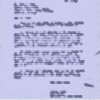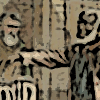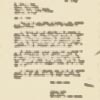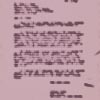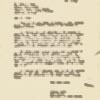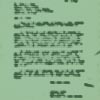Fighting Back: A Black Lawyer Argues Against Disenfranchisement
Annotation
While reformers were generally concerned with machine politics, the end of the nineteenth century saw another dramatic shift in the electoral landscape with widespread efforts to deny the vote to African Americans, particularly in the Southern states. For example, restrictive policies in South Carolina began with the election law of 1882 that used an intricate system of eight ballot boxes to discourage illiterate white and black residents from voting. The state's 1895 Constitutional Convention added a poll tax and literacy test, thereby ensuring that a coalition of remaining black voters and disaffected whites could not unite to challenge Democratic Party rule in South Carolina. A handful of black delegates to the Convention raised their voices against this disenfranchisement. One of them was William J. Whipper, a Northern black lawyer who had moved to South Carolina during Reconstruction to become a rice planter as well as a Republican political leader. In this speech to the Convention, Whipper argued for retaining African-American voting rights.
[W. J. Whipper:] You say that you must rule this country; that it's white man's country. We are here to ask you to stay your hand and do justice. . . .
We have only six of us here of the inferior race, and you have 154. Men upon this floor are clamoring for white supremacy, come here and assume dignity and call us niggers with the flippancy of barroom attendants. The trouble is "negro rule" and "white supremacy." Was there ever any such thing as negro rule in South Carolina? It was the rule of white men, supported by the negroes. Ain't there more negroes than white men on your farms? Yet, don't your wife rule? In the convention of 1868 there were less than a dozen negroes and less than a dozen white men engaged in the work done there. I am proud of the work done in that convention. The way it has stood the test has shown that there was nothing dangerous in it. They had simply taken the best parts of other Constitutions. Most of the men were there to vote as they were told.
This convention, 'tis said, is to prevent negro rule and establish white supremacy. Again, as a matter of fact, there never was any negro rule in South Carolina. When was there ever a time when we had a negro governor? We never had a majority of negro officers at any time in this State. Indeed, there were only four colored men who ever held any of the State offices, and that only for a single term each. There never was a county in this State controlled by colored officers. In fact all of the important officers, clerk of the court, sheriff, treasurer, auditors throughout the whole State, with less than half a dozen exceptions, have been filled by white men. Does this look like negro rule? Even in the darkest hours of reconstruction, when the bad legislation led to the fall of the Republican party, white men held the offices; white men did the robberies; many of them Democrats of the deepest die, who reaped the rewards for their purchase of negroes. There never was a negro lobbyist parading the corridors of this house. They were white men. Call them carpetbaggers, scalawags, renegades, what you will, they were white men, and are responsible for the bad legislation. Charge not this up to the account of the negro. There was never a time in even old Beaufort county, where there were not more white officers than negroes. Is that negro rule? Beaufort never had a colored sheriff during the reconstruction period. Talk about negro rule. The negro could have ruled, but he has shown discretion. There was never negro rule in a single county or a single town in this State. He challenged the body to say if there was a town with a negro intendant and a majority of the town council. If I am wrong correct me. We could have elected such in my town of Beaufort. We are 20 to 1 there. Does this look like negro rule? Does that look like we want to trample on the rights of the white man?
Do away with this negro rule howl. When the negroes had a majority in the lower house, the only place where they ever had a majority, white men governed them. Things were done there that were against his protest—white men ruled. Bonds were flooded all over the State. Corruption was rife. I proclaimed it on the floor. The leading Democratic newspaper in Charleston was even subsidized. He thought a negro brought the fact out in full. That is a matter of record. I warned them to stop. But who were the lobbyists that carried it all through? They were all white men. Some of them South Carolinians, some Democrats from New York. They must take the consequences. . . .
We are going to make this fight all along the line. I know that nothing I can say will change a single vote. I do say that sooner or later, God being always right, right will eventually prevail. We want you to understand that we have rights and they must sooner or later be recognized. We are testing the very ground work of this whole matter in the United States supreme court, and we will push it to the bitter end. We may go on to congress. We want this thing to pass in the very worst form it can pass.
Where township governments exist we then know every ra[s]cal in the community. We are now going on with our fight and try to sap the very foundation of this convention. It is a duty I owe to myself and this convention that I tell you this—not in a threatening spirit, however. We go to you now and ask for justice. God is just and justice cannot sleep forever. I have spoken to you in the kindest of spirit. Whatever concerns mankind, this convention, South Carolina, all these concerns me. Your people today—the negroes are yours—are deeply concerned.
If you vote down my amendment, then fix the matter in justice to the negro and to yourselves. Remember ever that the oppressor meets a just fate. Remember, too, that:
"The laws of changeless justice bind
Oppressor with oppressed
And close as sin and suffering joined
We march to fate abreast."
Source
Paul D. Escott and David R. Goldfield, Major Problems in the History of the American South, Vol. 2, The New South (Lexington, Mass.: D.C. Heath and Company, 1990), 180-182.
